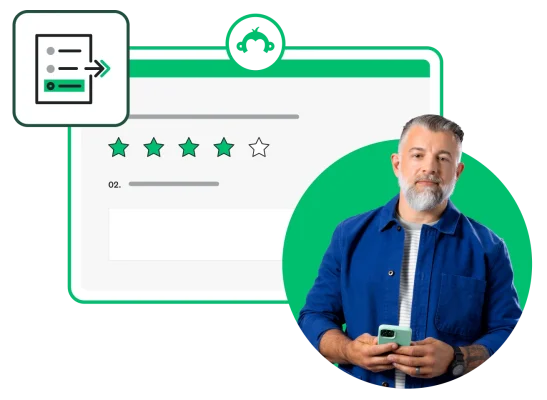Top 9 student survey questions to gather feedback
Transform your teaching with student survey questions. Get honest feedback on lessons, activities, and more to create a better learning environment.

- Student satisfaction surveys are crucial for gathering feedback on educational experiences. They help institutions identify strengths and areas for improvement, enhancing learning outcomes and student satisfaction.
- To increase student survey responses, ensure the survey is short and straightforward, communicate its importance, and offer incentives for participation.
- Teachers should survey their students periodically, ideally at the beginning, middle, and end of a course, to continually assess and improve the learning experience.
Student surveys are valuable sources of feedback for teachers and self-reflection for students. Surveys at the beginning, middle, or end of the school year can help you plan effective classes, reach struggling students, and improve your teaching methods.
Of course, not all student survey questions provide useful responses. Here's a list of student survey questions that'll help you gather actionable insights from your students.
Key questions to ask your students in a survey
1. Rank this year's lessons from easiest to hardest.
Find out what type of subject material your class struggles with by asking students to rank the most important lessons from easiest to hardest. The answers will help you understand the material that's relatively more challenging, allowing you to effectively modify your approach in the future. For example, you can hold a review session following that lesson. Or dedicate more time to improving its curriculum.
You can ask this question using a drag-and-drop ranking question type. Using lessons as your answer choices, you can quickly remind students what you covered in class.
These interactive questions are also fun and can prevent straight-lining (when a bored respondent completes a survey quickly by choosing the same answer for every question). Just be careful not to add too many answer options! Ten or more answer options may be too taxing for your respondents.
2. How much time do you spend on homework every night?
Homework reinforces learning, but some studies find that too much homework can negatively affect well-being. More than half of students, for example, say that homework is their primary source of stress. Students who spend more than two hours on homework each day are at risk of stress-related health problems.
Find out your students’ homework habits with multiple choice or slider questions. If any outliers appear—whether they spend very little time or way too much—follow up to discover why.
3. Which classroom activities do you learn from the most?
You probably already know which classroom activities your students really enjoy, but do you know which are the most valuable to their education?
Ask your students using a multiple-choice question. You can follow up with a single textbox question, asking why they found that activity to be so useful.
4. What are three things that can improve the class most?
If you've written student survey questions before, you know that often, the most helpful responses are also the most specific ones. So, ask students to list specific things they like and dislike about your class using a comment box. Students can choose to address classroom dynamics, classroom management, the curriculum, or whatever they want in this open-ended question.
5. Rate your teacher. How could she/he do better?
Many teachers are afraid to ask students for personal feedback. While opening yourself up to negative feedback is scary, seeking constructive criticism and taking it in stride will allow you to reach your full potential in your job.
Before you ask students to offer ways you can improve as a teacher, ask them to rate you with a number or slider scale. While the rating alone isn't particularly useful, it can help you gauge your progress as you improve.
6. What is one thing you'd change about the class if you could?
This question gets students thinking constructively about class instead of just critically. While you'll have to curate your students' suggestions based on what is and isn't realistic, adopting one or more suggestions shows your students you're listening to them.
7. What advice would you give to students in next year's class?
The advice that your students give to peers reveals a lot about their biggest takeaway from your class. When they give advice, what do they focus on: The lesson plans, the tests, the teaching style? This question reveals not just what current students think of your class, but the expectations future students will have on their first day.
8. What are you proud of accomplishing in class this year?
What project, assignment, or test gave each of your students pride in their learning? In class, we don't usually pause to celebrate individual student's successes. It's important, then, for students to identify and articulate their accomplishments. This is especially true given that pride in learning is closely linked to higher academic success.
9. What do you want to learn next?
If you ask this question at the beginning of the year, it helps you tailor your lesson plans to your students' interests. Asking it at the end of the year encourages your students to think about their independent academic interests. You might also want to pass on your students' answers to next year's teacher to build continuity of learning between the two classes.
Importance of student surveys

Student surveys are valuable education tools that offer insights into the student experience. The insight informs teaching methods and drives improvements in the learning environment. By understanding student perspectives, educators can create more effective and engaging courses and educational experiences.
Improve student outcomes
Student feedback directly influences educational strategies. Surveys reveal which teaching methods resonate with students and which areas need more attention.
For example, if many students find a lesson challenging, educators can revisit and modify their approach to ensure better comprehension. Regular feedback helps fine-tune teaching practices to meet diverse student needs, improving academic performance.
Ensure student satisfaction
A satisfied student is more likely to be engaged and motivated. Surveys can identify what students enjoy about their classes and what aspects they find frustrating. By addressing these concerns, educators can create a more positive learning environment.
For instance, if students express that interactive activities enhance their learning, teachers can incorporate more hands-on projects into their curriculum.
Track student progress
Surveys are an excellent tool for tracking student progress over time. By regularly collecting and analyzing feedback, educators can monitor student performance and satisfaction changes. This ongoing assessment helps identify trends and make data-driven decisions to support student growth.
For example, if surveys indicate a steady improvement in student engagement after implementing new teaching strategies, educators can continue to refine and expand these methods.
Encourage student voices
Giving students a voice in their education empowers them and promotes a sense of ownership. Surveys provide a platform for students to express their opinions and contribute to the learning process. This inclusion fosters a more democratic classroom environment where students feel valued and heard.
Student survey tips to increase response rates
Keep questions simple
Avoid overcomplicating your survey with jargon or lengthy questions. Simple, straightforward questions are easier for students to understand and answer.
For example, instead of asking, "How do you perceive the overall educational efficacy of our institution?" ask, "How satisfied are you with your classes?" Clear questions reduce confusion and improve the quality of responses.
Use a variety of question types
Mixing question types can make surveys more engaging. Use multiple-choice questions for quick responses, Likert scales to measure opinions, and open-ended questions for detailed feedback.
For example, combine "How satisfied are you with the school's facilities?" (Likert scale) with "What changes would you like to see in the facilities?" (open-ended). This variety keeps students interested and reduces survey fatigue.
Keep surveys short
Short surveys are more likely to be completed. According to SurveyMonkey data, the median number of questions in a survey is 12. Surveys with ten questions have a high completion rate of 89%, while those with 40 questions drop to 79%.
Focus on asking essential questions to avoid survey fatigue and improve data quality. A shorter survey ensures higher response rates and better data. If needed, follow up with more detailed student feedback or interviews for specific groups.
Provide incentives
Offering incentives can boost participation. These could be small rewards like extra credit, school swag, or entry into a prize draw. For example, "Complete this survey to win a gift card!" Incentives motivate students to take the time to provide thoughtful feedback.
Ensure anonymity
Students are more likely to be honest if they know their responses are anonymous. Clearly communicate that their feedback is confidential, such as, "Your responses are anonymous and will be used to improve the school environment." This assurance can increase the honesty and quality of the responses.
Frequently asked questions
- How do you conduct a student survey?
- How do you ask students for feedback?
- What is a student satisfaction score?
- What are good questions to ask high school students?
- What are good questions to ask college students?
Asking students the right questions with SurveyMonkey
Student survey questions play an important role in improving the student learning experience. By asking the right questions, you can identify what's working and what isn't in the classroom. This will help you focus on the areas that improve your teaching methods most. Your students' experience stands to benefit.
Discover more resources

How to use class feedback to improve teaching techniques
With SurveyMonkey’s education solutions, you can ask students, faculty, and people the right questions to make learning experiences better.

How to use Forms to enhance your survey experience
How do surveys and forms differ? Learn how to combine form data with survey feedback for seamless events and experiences.

Get the feedback you can act on with online evaluation forms
Unlock the power of feedback with SurveyMonkey's online evaluation forms. Start with our form builder today!

Childcare Registration Form Template
Streamline daycare enrollment with our daycare registration form template. Customize it to your needs with the intuitive SurveyMonkey form builder.